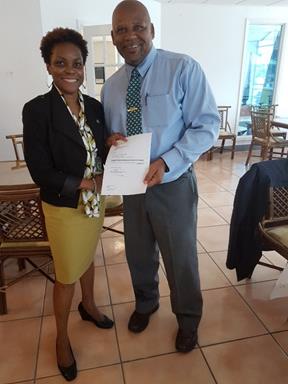|
|
Eleven Caribbean countries remove significant amounts of obsolete pesticides stocks
FAO News Release
November 20, 2017 10:30 A.M

Dr. Lystra Fletcher-Paul, FAO Subregional Coordinator Ezechiel Joseph and Minister of Agriculture, St Lucia. (Photo: FAO). |
Bridgetown, Barbados (TDN)
- In a commitment to agricultural safety, food security, environmental and human health, eleven Caribbean countries are now free from significant quantities of hazardous pesticide waste, as well as their contaminated containers and stores.
The removal of 319 tonnes of obsolete pesticides stocks and related wastes was confirmed by the Food and Agricultural Organization of the United Nations (FAO) at the 71st Special Meeting of the Council for Trade and Economic Development (COTED) on Agriculture, held at the Secretariat of the Caribbean Community (CARICOM), Georgetown, Guyana last month.
During the meeting Ministers of Agriculture from Antigua and Barbuda, Barbados, Dominica, Guyana, Jamaica, Saint Kitts and Nevis, Saint Lucia, Saint Vincent and the Grenadines, Suriname, and Trinidad and Tobago, were presented with disposal certificates indicating that dangerous obsolete pesticide stocks which were removed from their countries had been environmentally-soundly incinerated at a specialised facility in the United Kingdom. The certificates were presented by FAO Sub-regional Coordinator, Dr. Lystra Fletcher-Paul. Obsolete pesticides stocks from the Dominican Republic were also recently safeguarded and exported to the same facility for destruction, and their disposal certificates have been issued.
Due to the small size of the countries, limited human and financial resources and inadequate regulatory systems to adequately manage pesticide importation and use, Caribbean nations have been traditionally vulnerable to the entry of potentially harmful, unregistered and unregulated pesticides including counterfeit, poorly manufactured and banned products, which have posed risks for food security and food safety in the region.
“Removing this very hazardous toxic chemical waste from eleven Caribbean countries has eliminated a major risk from these fragile environments. The fact that it was done with no harm to people or the environment is a testament to the commitment and high quality of work delivered by all concerned,” said Mark Davis, Head of Safeguards at FAO and Facilitator for the development of the Caribbean Obsolete Pesticides project.
The achievement brings significant community and environmental health benefits through decreased exposure to highly hazardous and obsolete pesticides, by removing these chemical stockpiles as well as contaminated sites and containers.
“Obsolete pesticides that can no longer be used for any purpose are dangerous toxic waste. Stockpiles are often poorly stored and the toxic chemicals leak into the environment, threatening human and environmental health. Pesticides containers are also dangerous because they contain residues and are often used to store food or water,’’ said Guy Mathurin, Regional Project Coordinator at FAO’s Sub-regional Office for the Caribbean in Barbados.
The collective efforts to achieve the disposal of hazardous pesticides was made possible by the hard work and cooperation between the Governments of the project countries and the Coordinating Group of Pesticide Control Boards of the Caribbean (CGPC) with the support of technical expertise from FAO headquarters (Pesticide Risk Reduction Team) in Italy and financial support from the Global Environment Facility (GEF) in a project titled “Disposal of Obsolete Pesticides Including POPS, Promotion of Alternatives and Strengthening Pesticides Management in the Caribbean’’.
“The biggest challenges for the countries are to prevent accumulation of obsolete pesticides by enhancing national capacity on legislation, doing risk assessment, proper management of stock management and using non-chemical pesticides, applying Integrated Pest Management (IPM) and agroecology practices to solve the problems at the source. Clearly, the countries in the Caribbean region are dedicated and continuously put tremendous efforts to strengthening life cycle management of chemicals,” said Baogen Gu, Senior FAO Officer and Team Leader of the Pesticide Risk Reduction Team.
Under the project, access to and use of less- and non-toxic alternatives for pest and disease control in crops will be promoted in order to enhance the quality of food products through better control of pesticides, ultimately reducing pesticide residues on food and in the environment.
“The elimination and final disposal of 319 metric tonnes of obsolete pesticides from within eleven Caribbean territories, with the technical support of FAO, and funded by GEF is a remarkable success story. These countries have been given a clean slate from which to launch and implement a pesticide stock management system that prevents the future accumulation of obsolete pesticides stocks. In order to achieve this, it is imperative that all stakeholders, in particular the pesticide industry heeds its responsibilities as outlined in the FAO/World Health Organization (WHO) International Code of Conduct for Pesticides Management,” said Miriam Serrut, Registrar of Pesticides of the Belize Pesticides Control Board, who is the current Chairperson of the CGPC. “The CGPC expresses its sincerest appreciation to the national counterparts involved in the disposal project, the FAO, primarily project consultant Guy Mathurin, the GEF, and the disposal company Veolia Environment for a job well done. Congratulations!”

|
|
|
